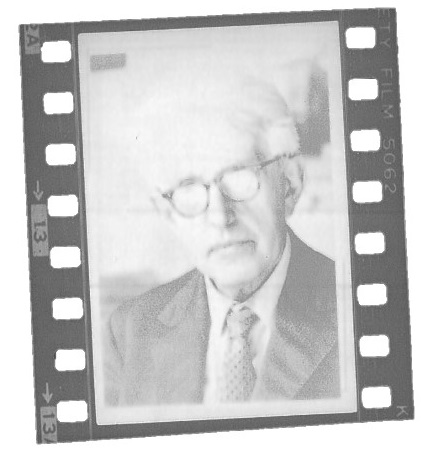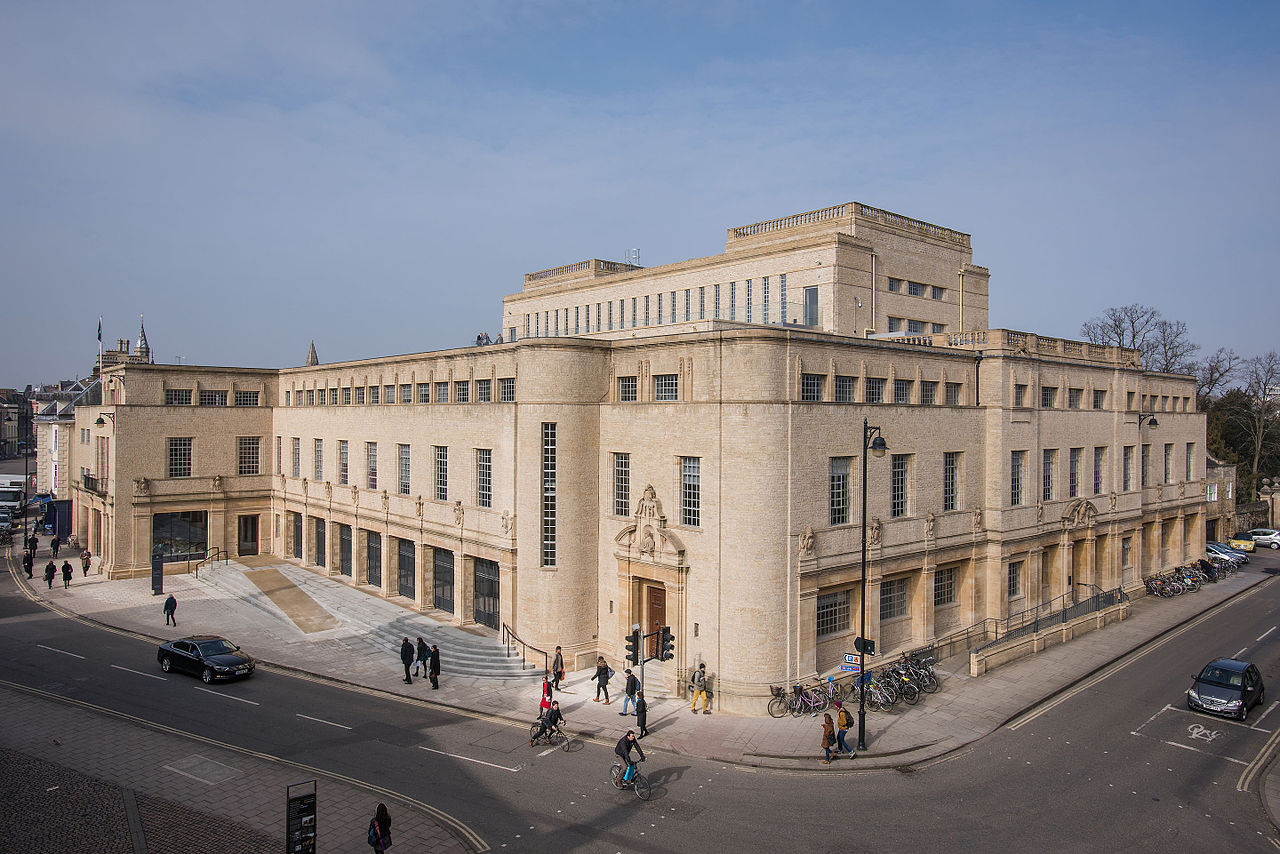En route to Oxford
Image: The Weston Library, Oxford, detail. John Cairns photography for the Bodleian Libraries. Used under Creative Commons Attribution-Share Alike license 4.0
Dr Hine writes:
This morning, I’m on a train to Oxford, headed for the archives of the Society for the Protection of Science and Learning. I won’t be able to publish my findings directly, as the SPSL’s successor CARA (the Council for At-Risk Academics) must authorise any publication. So it makes sense to at least map out why I’m going, what I’m hoping to find, and how it is relevant to the wider project.
Cassirer and the Academic Assistance Committee
Heinrich Walter Cassirer (HWC) was one of the first academics to receive assistance from what was originally named the Academic Assistance Committee. Like a majority of the AAC’s early beneficiaries, as a Jew HWC was no longer welcome in the universities of Nazi Germany.[1]
The biographical information I have at hand includes the autobiographical statements incorporated into the prefaces of his Kant and Aristotle commentaries, and accounts of his life produced for the posthumous publications, supplemented by some anecdotal information from the local archive paperwork. The latter reveals, for example, that during his time at Oxford HWC tutored Iris Murdoch;[2] that he began to study the letters of Paul while on holiday with friends (among whom was Olive Corkey, whom he later married);[3] and that after his conversion, he was wont to interrupt sermons.[4]
According to his own testimony, Ronald Weitzman (RW) met HWC sixteen years prior to the latter’s death (i.e. 1963). There’s no information about the circumstances in which they met, but RW would have been 18 or 19 at the time. When RW later set out to produce a timeline of HWC’s life, much of what he knew (or recalled) was based on what HWC had willingly revealed to him (or to Olive). There are gaps, especially with regard to his early years in the UK. Yet these very years (1934–1945) are documented in some form within the SPSL archives, where box 313/1-4 contains 561 leaves pertaining to Werner Brock, Martin Buber, and HWC.
What might I find?
HWC himself touches upon the “mental paralysis” induced by the era of appeasement and war in the preface to his 1954 commentary, attributing to it a temporary inability to take forward his research.[5] What he does not say, is that he, in common with many exiled German Jewish academics, was interned on the Isle of Man in 1940, as an “enemy alien”. It is possible that there will be information about this very difficult period.
H J Paton
In the 1938 preface, HWC is clear that his work on Kant would not have been possible without the support of Professor H. J. Paton. By 1954, he has become more explicit: his work on Kant is the epitome of moral duty, something he did not want to do. It seems that HWC felt obligated by Paton as something of a patron, and that raises the question: How did Paton come to assume the position of patron?
It is already evident that Paton knew the elder Cassirer: he co-edited a collection of essays marking Ernst’s 60th birthday. It is also notable that when HWC moved to Oxford, he was effectively following Paton, who had taken up his chair as White’s Professor of Moral Philosophy a year earlier. HWC had himself passed through Oxford on the way to Glasgow, and is recorded as the first refugee scholar to attend Oxford’s Philological Society, as a guest in March 1934.[6] I am hopeful that Paton’s role in HWC’s positions will be documented in the SPSL archive.
Raymond Klibansky
The other co-editor of the Ernst Cassirer festschrift was Raymond Klibansky. The connection between Klibansky and HWC is also interesting. According to a recent study of Klibansky, the two were schoolfellows at the Odenwaldschule, though Klibansky was a couple of years younger than HWC. [7] It was HWC who introduced Klibansky to his father in the 1920s—and consequently to the Warburg Library. Both HWC and Klibansky contribute to the appendices of Ernst Cassirer’s festschrift for the founder Aby Warburg (Individuum und Kosmos, 1927). Klibansky was later active in the library’s relocation to London (a bibliographic refuge), and is recorded to have refused a role at the University of Glasgow (where HWC was) because this would take him too far from the institution he sought to protect.[8] So I’m hoping to learn something more about HWC’s involvement in this social network—he cannot have exactly shared Klibansky’s commitment to the library, but then Klibansky had already achieved his Habilitat, a key postdoctoral qualification, whereas HWC had not. This means HWC would have been a less established and therefore more vulnerable early career scholar, if not (as apparently alleged in a 1992 article in the Oxford Magazine) still completing his doctorate. So perhaps he had less agency.
I may also learn something more about the generosity of the Jewish community in Glasgow, whom HWC credits. Of his academic precarity. Of his ambitions. Of how he supported his wife and daughter. Of interactions with his father (who was briefly also supported by the AAC/SPSL). Of his English studies. And so on.
I’m looking forward to filling the gaps.
Notes
[1] For a brief history, see cara.ngo/who-we-are/our-history/. For further detail on the establishment of the AAC and its successors see: David Zimmerman, “The Society for the Protection of Science and Learning and the politicization of British science in the 1930s”, Minerva, 44.1 (2006), pp. 25–45; Shula Marks, Paul Weindling, and Laura Wintour (eds.) In defence of learning: The plight, persecution and placement of academic refugees, 1933–1980s (OUP/British Academy, 2011); and Sally Crawford, Katharina Ulmschneider, and Jas Elner (eds.), Ark of Civilization: Refugee Scholars and Oxford University, 1930–1945 (OUP, 2017).
[2] Correspondence between RW and an assistant to Murdoch’s biographer.
[3] From a promotional interview with Olive when God’s New Covenant was published, in the Christian Bookseller. RW cautions that there are errors in the article; for example, the report that HWC himself had introduced Thomas Torrance to his New Testament translation (whereas that was RW, posthumously).
[4] From a sermon preached at Christmas 1989, by a former priest of his parish.
[5] See Cassirer, Kant’s First Critique, page 10.
[6] See Sally Crawford and Katharina Ulmschneider, “‘The Bund’ and the Oxford Philological Society” in The Ark of Civilization, page 137. They are explicit that Cassirer moved “with [Paton], becoming a lecturer at Corpus Christi College”.
[7] Philippe Despoix and Jillian Tomm, eds. Raymond Klibansky and the Warburg Library Network: Intellectual Peregrinations from Hamburg to London and Montreal, (McGill-Queen’s Press, 2018).
[8] See Elizabeth Sears, “Keepers of the Flame: Bing, Solmitz, Klibansky and the Continuity of the Warburg Tradition” in the above, page 36. The festschrift was Klibansky’s project, and he invited Paton’s patronage knowing it would ease the prospect of securing a British publisher for a work including German language scholarship; so Graham Whitaker “The Warburg Institute reaches out: Klibansky and his British contacts”, in the same volume, see especially page 86 and following.

